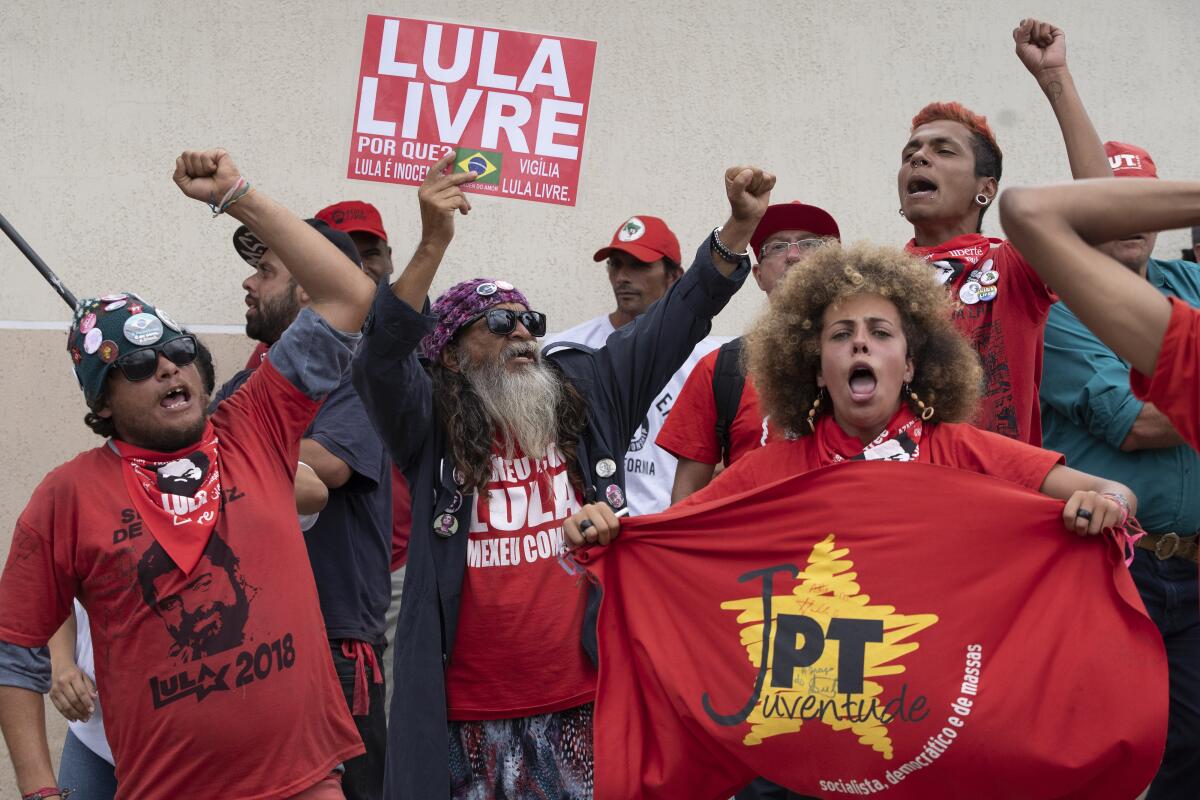Brazilian ex-president Lula released from imprisonment

- Share via
SAO PAULO, Brazil — Cheers and chants of “Lula livre” erupted as former Brazilian President Luiz Inácio Lula da Silva walked out of the federal police headquarters Friday in the city of Curitiba, where he had been jailed since April 2018.
Supporters wearing the red and white of his Workers’ Party had gathered at the building’s gates earlier in the day following a judge’s decision to set him free.
Moments after his release, Lula addressed the crowd of about 200.
“For 580 days you were here shouting: ‘Good morning Lula, good afternoon Lula, good night Lula,’” he said. “It didn’t matter if it was raining, if it was 40 degrees or if it was zero degrees. Every single day, you were what fed democracy.”
The decision to free him came after the country’s Supreme Court decided late Thursday in a 6-5 vote that a person can only be jailed once all appeals to higher courts have been exhausted.
Lula is still appealing his 2017 conviction on corruption and money laundering in connection with the purchase of a beachfront apartment in Sao Paulo state.
Lula’s attorney, Cristiano Zanin, said he expects “the entire case to be nullified.”
Friday’s judgment is in sharp contrast to the top court’s ruling in February 2016 that said defendants whose convictions are upheld can be jailed while other appeals are still pending.
The ruling opens a legal path for the release of some 5,000 inmates with cases on appeal, including several other top politicians and business leaders ensnared in the billion-dollar corruption investigation known as Lava Jato, or Car Wash.
Lula was initially found guilty in July 2017 of accepting $1.2 million in bribes from contractor OAS in exchange for helping the company win contracts with state-run oil giant Petrobras, a conviction that was upheld in April 2018 by a group of judges who ordered his imprisonment.
Held in a 161-square-foot room at the federal police headquarters, the former union leader maintained his innocence and said his imprisonment was politically motivated.
President from 2003 to 2010, he left office with an 87% approval rating thanks to drastic reductions in the country’s poverty rate through social welfare programs.
Since his implication in the Lava Jato investigation, he has become extremely divisive, with many Brazilians blaming him for the country’s financial and political woes, and others standing staunchly in his support.
Jail didn’t stop him from entering last year’s presidential race as the candidate of the Workers’ Party. He was favored to win until he was declared ineligible under Brazil’s Clean Slate Law, which bars those convicted of a crime from holding office for eight years after completing their sentences.
He was then replaced by a former mayor of Sao Paulo, Fernando Haddad, who lost to Jair Bolsonaro, the current far-right president.
Langlois is a special correspondent.
More to Read
Sign up for Essential California
The most important California stories and recommendations in your inbox every morning.
You may occasionally receive promotional content from the Los Angeles Times.










